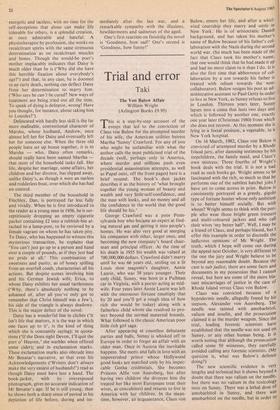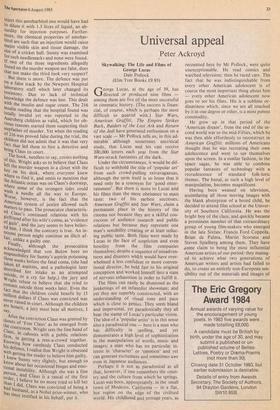Trial and error
Taki
The Von Bulow Affair William Wright (Arlington Books £9.95) his is a step-by-step account of the
1. events that led to the conviction of Claus von Bulow for the attempted murder of his wife, the American utilities heiress Martha 'Sunny' Crawford. For any of you who might be unfamiliar with what the author calls the most publicised trial of the decade (well, perhaps only in America, where murder and millions push even presidential assassination attempts, as well as Papal ones, off the front pages) here is a brief resume. The book's dust jacket describes it as the history of 'what brought together the young woman of beauty and wealth and very little'self-confidence, and the man with looks, and no money and all the confidence in the world that the- good life should be his.'
George Crawford was a poor Penn- sylvania boy who became an expert at find- ing natural gas and getting it into people's homes. He was also very good at merging his companies with other, larger ones, and becoming the new company's board chair- man and principal officer. At the time of his death in 1935 his wealth was valued at 700,000,000 dollars. Crawford didn't marry until he was 66 years old, settling on a St Louis shoe magnate's daughter, Annie Laurie, who was 38 years younger. Their only child, Sunny, was born in a Pullman car in Virginia, with a porter acting as mid- wife. Four years later Annie Laurie was left with the enormous fortune (multiply that by 20 and you'll get a rough idea of how rich she would be today) along with a fatherless child whom she resolved to pro- tect beyond the normal maternal bounds. What followed is the classic American poor little rich girl saga.
After appearing at countless debutante parties and balls, Sunny is whisked off to Europe in order to forget an affair with an older man. Once in Austria the inevitable happens. She meets and falls in love with an impoverished prince whose Hollywood good looks are matched only by his impec- cable Gotha credentials. She becomes Princess Alfie von Auersberg, but after having two children she divorces him (he treated her like most Europeans treat their wives, as concubines) and returns to live in America with her children. In the mean- time, however, an acquaintance, Claus von
Bulow, enters her life, and after a whirl- wind courtship they marry and settle in New York. He is of aristocratic Danish background, and has taken his mother's name of Bulow because of his father's col- laboration with the Nazis during the second world war. (So much has been made of the fact that Claus took his mother's name, that one would think that he had made it up and had no more claim to it than I do. It is also the first time that abhorrence of col- laboration by a son towards his father is treated with odium towards the non- collaborator). Bulow resigns his post as ad- ministrative assistant to Paul Getty in order to live in New York, as Sunny refuses to live in London. Thirteen years later, Sunny lapses into a coma that lasts two days and which is followed by another one, exactly one year later (Christmas 1980) from which she does not recover. At this moment she is lying in a foetal position, a vegetable, in a New York hospital.
On 16 March, 1982, Claus von Bulow is convicted of attempted murder by a Rhode Island jury, after damning testimony by his stepchildren, the family maid, and Claus's own mistress. Three fourths of Wright's book deals with the trial. It is not a bad read as such books go. Wright seems to be fascinated with the rich, so much so that he performs one of the subtlest hatchet jobs I have yet to come across in print. Bulow is consistently portrayed as a greedy, gigolo type of fortune hunter whose only ambition is to better himself socially. But with whom? Wright seems to think with the peo- ple who wear those bright green trousers and multi-coloured jackets and who call their wives 'my better half'. Well, I may be a friend of Claus, and perhaps biased, but I offer this example in order to discredit the ludicrous opinions of Mr Wright. The truth, which I hope will come out during the appeal next October, is very different to the one the jury and Wright believe to be beyond any reasonable doubt. Because the case is sub judice, there are some facts and documents in my possession that I cannot reveal, but here are some of the more bla- tant miscarriages of justice in the case of Rhode Island versus Claus von Bulow.
Claus was convicted because of a hypodermic needle, allegedly found by his stepson, Alexander von Auersberg. The needle was tainted with amobarbitol, valium and insulin, and the prosecution claimed it as the murder weapon. Since the trial, leading forensic scientists have established that the needle was not used on Sunny, or any other human being. It is worth noting that although the prosecution called some 50 witnesses, they carefullY avoided calling any forensic scientists. (MY question is, what was Bulow's defence doing?)
The new scientific evidence is very lengthy and technical, but it shows beyond a doubt that there was valium on the needle, but there was no valium in the toxicologY tests on Sunny. There was a lethal dose of amobarbitol in Sunny, and there was amobarbitol on the needle, but in order to
inject this amobarbitol one would have had to dilute it with 1.5 litres of liquid, an ab- surdity for injection purposes. Further- more, the chemical properties of amobar- bitol are such that an injection would cause major visible skin and tissue damage, the Size of a cricket ball. Sunny was examined for such needlemarks and none were found. If two of the three ingredients allegedly found on the murder weapon are false, does that not make the third look very suspect?
But there is more. The defence was put on a false track by the Newport Hospital laboratory staff which later changedits testimony. Due to lack of technical knowledge the defence was lost. This dealt with the insulin and sugar count. The 216 Insulin reading that the hospital found was totally invalid yet was reported to the Auersberg children as valid, which for ob- vious reasons started them suspecting their tw Stepf.t, .-er of murder. Yet when the reading of 216 was proved false during the trial, the children did not admit that it was that very fact that led them to hire a detective and bring Claus to court. The book, needless to say, covers nothing left the Wright asks us to believe that Claus lett the murder weapon in a closet with the key on his desk, where everyone knew where to find it, and omits to mention that the Atlantic ocean was on Claus's doorstep, Where some of the strongest tides could wash a needle all the way to Europe. Worse, however, is the fact that the American system of justice allowed such matters to pass. The prosecutor characteris- ed Claus's continued relations with his girlfriend after his wife's coma, as 'evidence of guilt', and the jury seems to have believ- ed him. I think the contrary is true. An in- nocent person might continue an illicit af- fair, unlike a guilty one. Finally, although the prosecution acknowledged that von Bulow bore no responsibility for Sunny's aspirin poisoning three weeks before the fatal coma, (she had taken 65 aspirins, and a pathologist later described her intake as an attempted suicide, or a cry for help,) the jury and Wright refuse to believe that she tried to commit suicide three weeks later. Even the fact that the children could benefit by 15 million dollars if Claus was convicted was never raised in court. Although the children are honest, a jury must hear all motives, I say, After the conviction Claus was greeted by shouts of 'Free Claus' as he emerged from the Courtroom. Wright sees the fine hand of Claus, in cahoots with a public relations firm, in getting a rent-a-crowd together. Knowing how carelessly Claus conducted his defence, I realise that Wright is obsessed with getting the reader to believe him guilty. 1 knew Sunny very slightly, but enough to know about her occasional binges and emo- tional instability. Although she was a fine Person, and Claus is a rascal of the first order, I believe he no more tried to kill her bad I did. Claus was convicted of being a n
,ad husband, as a Nobel prize-winner, who has since testified in his behalf, put it.







































 Previous page
Previous page